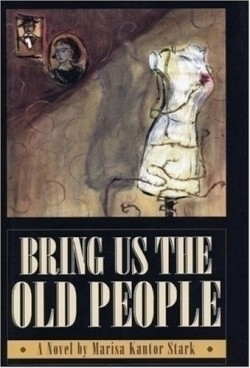Bring Us the Old People
How does a 92-year-old Jewish woman who survived the Holocaust by hiding in a root cellar feel about spending her last days in a New Jersey old folk’s home? And does she still have something to hide? In a fine first novel, Marisa Kantor Stark captures the voice of Maime Schatz with impeccable pitch. Stark visited a Jewish nursing home while studying at Princeton and the fragments she gathered in conversations with a tough, vibrant, but aging survivor of the Nazi occupation of Poland inspired this novel of astonishing hardship, luck, endurance and guilt. With her heart “like a flower shutting in,” Maime slips through the indignities of the present (no coffee, the indifference of her nephew and his family who forced her to leave her home, the mental and physical deterioration of the other patients and then herself) into clear recollections of her childhood in Poland, of her surviving the war under a farmer’s house, and of her childless adulthood in Newark where she and her husband settled after the war. In alternating chapters, the reader is taken from the present back to a Polish village where the religious discipline and poignant images of Maime’s family are shattered by “the Hitlers.”
Stark’s fine detail reveals the apple dolls Maime carved at her mother’s little grocery store, the sound of her father’s voice in prayer, the candles lit for Shabbos, and “wet, shiny dough, baked into gorgeous challahs.” But horror arrives with Maime’s adulthood, and just as the flashbacks seem to settle into a series of atrocities and terrors heroically endured, Maime’s guilt reminds us of the title’s meaning. “The Hitlers” commanded “Bring us die alt war, zum Schiessen” (“Bring us the old people so we can kill them.”) Already caring for her aging parents and in-laws in her own house, Maime and husband Saul are given no choice. In the climactic scene they must deliver their own parents to a German train bound for Auschwitz. Could they have hidden the old people? Should she have ignored her father’s advice to obey “the Hitlers?” As clear and unblinking as Stark’s prose, the eyes of Maime’s father shine on her for the last time “seeing something we can’t the rest of us see.” Early in the novel, Maime tells us she comes from a family that tells the truth. But surviving all she has suffered and by telling the tragic truth, Maime Schatz triumphs. And so does Marisa Kantor Stark.
Reviewed by
Norm Wheeler
Disclosure: This article is not an endorsement, but a review. The publisher of this book provided free copies of the book to have their book reviewed by a professional reviewer. No fee was paid by the publisher for this review. Foreword Reviews only recommends books that we love. Foreword Magazine, Inc. is disclosing this in accordance with the Federal Trade Commission’s 16 CFR, Part 255.

